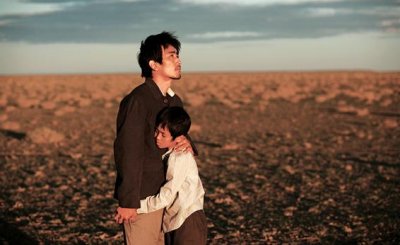Movie ‘Crossing’ Wins High Praise

It also Raises Valid Questions
Based on a true story, the Korean movie “Crossing” took four years to complete. Until the movie was publicly announced in March this year, the entire project was kept under tight security, including all filming done in South Korea, China, and Mongolia. “Crossing” focuses on the reality of life in North Korea and the flood of defectors leaving the country. The secrecy was necessary because there were fears that pro-North Korean elements in South Korea might sabotage the project.
Weakened by malnutrition, a woman falls ill with tuberculosis, and her husband resolves to enter China for medicine and food. The husband manages to elude Chinese police and eventually reaches South Korea. Desperately he tries to save his wife and son.
Thanks in part to its superb camera work, this movie will shake your soul, even though the story itself is not especially unique.
“Crossing” was first screened in Japan on June 17, hosted by NO FENCE. Following that, the movie was shown in several other venues during late June and early July.
Audience comments:
- I feel reassured of the importance of people’s lives and their interrelationships, and the strength of family bonds. I hope that North Korea can become a country that seeks for and realizes the happiness of its people.
- The subdued expressions successfully highlight true sadness.
- He had to leave his homeland and even his family in order to save their lives. If this kind of situation has been caused by people, then it should be corrected by people.
- A real masterpiece of human drama has no border. The movie made an intense impression on me that won’t ever fade.
- This is not someone else’s affairs. I wonder if our own family member will manage to escape from North Korea and get back to Japan (comment by a member of a Japanese NGO called “Investigation Commission on Missing Japanese Probably Related to North Korea.”
- I believe this will be a historic masterpiece. Anybody who has seen this movie should be thinking what they can do.Many of those in Washington DC and New York who saw the movie (with English subtitles) commented with tears that it was very touching.
The universal appeal comes from the subdued tone of the movie arising from the introspection of the production team.
At the premier of Crossing in Tokyo, the director, Mr. Kim Tae Gyun said “We were not able to disclose even a tenth of the reality of North Korea. However, I feel that the heavy load on my heart has been reduced a little now that we have finally brought this work out to the public eye.” Director Kim Tae Gyun is known for his entertaining movies, such as Volcano High, the digital action movie.
What motivated him to make Crossing?
About ten years ago, Mr. Kim happened to see footage of starving street children shivering in a market in North Korea. He was shocked to know the reality lying so close to South Korea, where food is so plentiful. This footage touched him deeply, and he felt he should make a movie about the children. He was unable to get the project started, however, since he knows the limitations of the movie business. But four years ago, he finally made up his mind to move forward and initiated production.
Because of the controversial topic of Crossing, the lead actor Cha In Pyo three times refused to play the part of a North Korean defector when repeatedly asked by the director. He feared that he might become entangled in political ideologies. He was also concerned about risking the romantic image he had built up. Cha In Pyo prayed for some time before finally accepting the role.
In the two weeks following the June 26th release of Crossing in South Korean movie theaters, attendance surpassed one million. Box office numbers continue to rise.
The Korean Film Council announced that it has selected Crossing as the Korean submission to the 81st Academy Awards for the Best Foreign Film section.
In the movie, when the husband is told that his wife has died, he wonders “Does God only exist in rich countries? If not, why does He let North Korea stay this way?”





